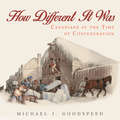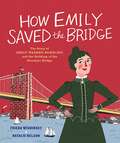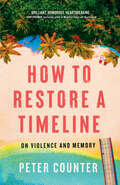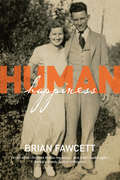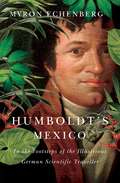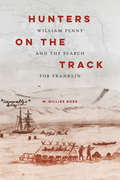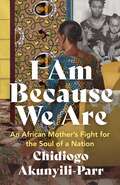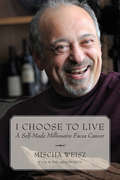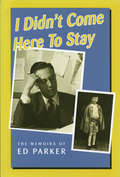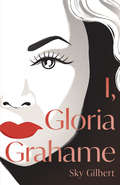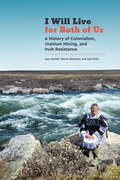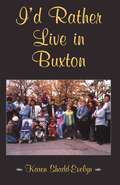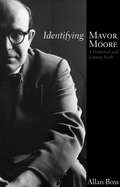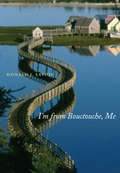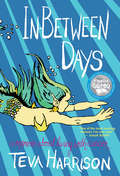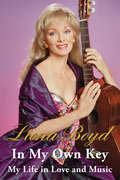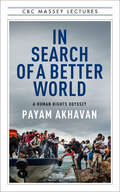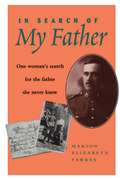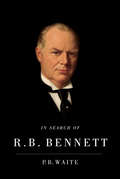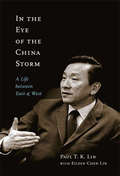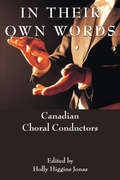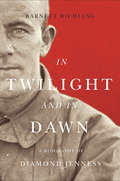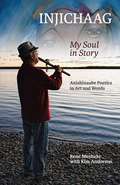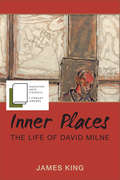- Table View
- List View
How Different It Was: Canadians at the Time of Confederation
by Michael J. GoodspeedAn enthralling exploration of the lifestyles, ideas, habits, organizations, customs, fears, and aspirations of Canadians in the age of Confederation. Too often we think of Victorian Canada as dull. We imagine our ancestors as sepia-tinged, dour, excruciatingly respectable figures sitting stiffly in over-decorated parlours. In How Different It Was, Michael J. Goodspeed changes all that, bringing to life the tumult and enthusiasm of ordinary and unconventional Canadians — from across the country and every walk of life — in an extraordinary time. The political manoeuvring and power struggles of the decades when Canada was emerging as a nation are well known, but we are less familiar with the lives and circumstances of everyday Canadians in the Confederation era. How Different It Was vividly brings to life the lifestyles, attitudes, habits, and mindset of a colourful generation of Canadians who were, in so many ways, so different from our own.
How Emily Saved the Bridge: The Story of Emily Warren Roebling and the Building of the Brooklyn Bridge
by Frieda WishinskyThe amazing story of Emily Warren Roebling, the woman who stepped in to oversee the construction of the Brooklyn Bridge, which was completed in 1883.Emily was not an engineer, but she was educated in math and science. She married Washington Roebling, the chief engineer of the famous bridge. When Washington became ill from decompression sickness, Emily stepped in, doing everything from keeping the books, to carrying messages for her husband, to monitoring the construction of the bridge. She was the first person to cross the Brooklyn Bridge when it opened.Emily, who went on to study law among many other accomplishments, is an inspiration to all, as demonstrated through Frieda Wishinsky’s informative and engaging text and Natalie Nelson’s distinctive collage illustrations. Speech bubbles revealing imagined dialogue add a playful note to this historical account, which includes fascinating facts about the Brooklyn Bridge and a further reading list.Key Text Featuresfurther readingspeech bubblesCorrelates to the Common Core State Standards in English Language Arts:CCSS.ELA-LITERACY.RL.2.1Ask and answer such questions as who, what, where, when, why, and how to demonstrate understanding of key details in a text.CCSS.ELA-LITERACY.RL.4.3Describe in depth a character, setting, or event in a story or drama, drawing on specific details in the text (e.g., a character's thoughts, words, or actions).
How to Restore a Timeline: On Violence and Memory
by Peter CounterA kaleidoscopic blend of personal essays and cultural criticism that explores the profound and occasionally horrific truths of what it means to be traumatized. When a stranger shoots his dad on a Costa Rican pier, Peter Counter hauls his blood-drenched father to safety. Returning home, Counter discovers that his sense of time and memory is shattered, and in its place is a budding new mental illness: post-traumatic stress disorder. Counter begins to see violence everywhere. From the music of Cat Stevens to Jeb Bush’s Twitter feed. Walter Benjamin to Johnny Carson. Taskmaster. Video games. ASMR videos on YouTube. The world is steeped in gore. Again and again, Counter finds himself reliving his father’s shooting as his trauma is fragmented, recast, and distorted on a compulsive mental tilt-a-whirl. Formally inventive and incisively smart, How to Restore a Timeline revels in a fragile human condition battered by real conflict and hyper-curated media portrayals of death. Channelling John Jerimiah Sullivan and Carmen Maria Machado, these essays look us dead in the eye and ask: What kind of life can we piece together amid all the carnage?
Human Happiness
by Brian Fawcett"The last time I talked to my mother, she announced that she hated my father." So begins Brian Fawcett’s compelling new book about happiness and a new way of looking at family. A public intellectual who will shame the devil in the interests of truth, Brian Fawcett has staunchly refused to buy into the prevailing techno-corporate ethos that defines our culture today. With Human Happiness, Fawcett has taken another leap into unexplored territory. Where previously Fawcett has explored such topics as globalization and the role of the media, this time he turns the lens inward to search for the meaning of happiness by examining the mysteries of marriage and family. Featuring prose that is often painfully candid and frequently laugh-out-loud funny, Human Happiness is a story-driven narrative centered around the seemingly happy marriage between Fawcett’s parents, about how families really work (or don’t), about the intergenerational conflicts that seem inevitable between headstrong fathers and sons, and how old hostilities can poison and distort through generations and – in extraordinary cases – can be resolved. For 25 years now, Brian Fawcett has been Canada’s most unconventional writer and public intellectual, a man Paul Quarrington described as our literature’s enfant terrible and eminence gris rolled into one. His true gift is for making readers laugh while raising the most fundamental questions that face us. He might be Canada’s most original writer.
Humboldt's Mexico: In the Footsteps of the Illustrious German Scientific Traveller
by Myron EchenbergThe incalculable influence of Alexander von Humboldt (1769–1859) on biology, botany, geology, and meteorology deservedly earned him the reputation as the world’s most illustrious scientist before Charles Darwin. Humboldt’s breath-taking explorations of Mexico and South America from 1799 to 1804 are akin to Europe’s second “discovery” of the New World – this time, a scientific one. His Political Essay on the Kingdom of New Spain is a foundational document about Mexico and its cultures and is still widely consulted by anthropologists, geographers, and historians. In Humboldt’s Mexico, Myron Echenberg presents a straightforward guide with historical and cultural context to Humboldt’s travels in Mexico. Humboldt packed a lifetime of scientific studies into one daunting year, and soon after published a four-volume account of his findings. His adventures range widely from inspections of colonial silver mines and hikes to the summits of volcanoes to meticulous examination of secret Spanish colonial archives in Mexico City and scientific discussions of archaeological sites of pre-Hispanic Indigenous cultures. Echenberg traces Humboldt’s journey, as described in his publications, his diary, and other writings, across the heartland of Mexico, while also pursuing Humboldt’s life, his science, his experiences, his influence on scholars of his time and after, and the various efforts by others to honour and at times to denigrate his legacy. Part history, part travelogue, and always highly readable and informative, Humboldt’s Mexico is an engaging account of a gifted scientist and visionary that ranges across topics as diverse and broad as natural history was in his era.
Hunters on the Track: William Penny and the Search for Franklin
by W. RossCaptains of whaling vessels were experienced navigators of northern waters, and William Penny was in the vanguard of the whaling fraternity. Leading the first maritime expedition in search of Sir John Franklin, he stood out not just for his skill as a sailor but for his curiosity about northern geography and his willingness to seek out Inuit testimony to map uncharted territory. Hunters on the Track describes and analyzes the efforts made by the Scottish whaling master to locate Franklin's missing expedition. Bookended by an account of Penny's whaling career, including the rediscovery of Cumberland Sound, which would play a vital role in British whaling a decade later, W. Gillies Ross provides an in-depth history of the first Franklin searches. He reconstructs the brief but frenetic period when the English-speaking world was preoccupied with locating Franklin, but when the means of that search – the ships chosen, the route taken, the evidence of Franklin's traces – were contested and uncertain. Ross details the particularities of each search at a time when no fewer than eight ships comprising four search expeditions were attempting to find Franklin's tracks. Reconstructing events, relationships, and decisions, he focuses on the work of Penny as commander of HMS Lady Franklin and Sophia, while also outlining the events of other expeditions and interactions among the officers and crews. William Penny is respected as one of the most influential and innovative figures in British Arctic whaling history, but his brief role in the Franklin expedition is less known. Using primary sources, notably private journals from each of the expeditions, Hunters on the Track places him at the forefront of a critical chapter of maritime history and the geographical exploration that began after Franklin disappeared.
Hunters on the Track: William Penny and the Search for Franklin
by W. Gillies RossCaptains of whaling vessels were experienced navigators of northern waters, and William Penny was in the vanguard of the whaling fraternity. Leading the first maritime expedition in search of Sir John Franklin, he stood out not just for his skill as a sailor but for his curiosity about northern geography and his willingness to seek out Inuit testimony to map uncharted territory. Hunters on the Track describes and analyzes the efforts made by the Scottish whaling master to locate Franklin's missing expedition. Bookended by an account of Penny's whaling career, including the rediscovery of Cumberland Sound, which would play a vital role in British whaling a decade later, W. Gillies Ross provides an in-depth history of the first Franklin searches. He reconstructs the brief but frenetic period when the English-speaking world was preoccupied with locating Franklin, but when the means of that search – the ships chosen, the route taken, the evidence of Franklin's traces – were contested and uncertain. Ross details the particularities of each search at a time when no fewer than eight ships comprising four search expeditions were attempting to find Franklin's tracks. Reconstructing events, relationships, and decisions, he focuses on the work of Penny as commander of HMS Lady Franklin and Sophia, while also outlining the events of other expeditions and interactions among the officers and crews. William Penny is respected as one of the most influential and innovative figures in British Arctic whaling history, but his brief role in the Franklin expedition is less known. Using primary sources, notably private journals from each of the expeditions, Hunters on the Track places him at the forefront of a critical chapter of maritime history and the geographical exploration that began after Franklin disappeared.
I Am Because We Are: An African Mother’s Fight for the Soul of a Nation
by Chidiogo Akunyili-ParrIn this innovative and intimate memoir, a daughter tells the story of her mother, a pan-African hero who faced down misogyny and battled corruption in Nigeria. Inspired by the African philosophy of Ubuntu — the importance of community over the individual — and outraged by injustice, Dora Akunyili took on fraudulent drug manufacturers whose products killed millions, including her sister. A woman in a man’s world, she was elected and became a cabinet minister, but she had to deal with political manoeuvrings, death threats, and an assassination attempt for defending the voiceless. She suffered for it, as did her marriage and six children. I Am Because We Are illuminates the role of kinship, family, and the individual’s place in society, while revealing a life of courage, how community shaped it, and the web of humanity that binds us all.
I Choose To Live: A Self-Made Millionaire Faces Cancer
by Mischa Weisz Wade HemsworthBy the time he was diagnosed with terminal pancreatic cancer in 2007, Mischa Weisz had all he needed to face the fight of his life. A child of Holocaust survivors, he felt distant from his parents and had no idea of his own heritage until he was well into his teens - too late to adopt it as his own. When Mischa and his first wife split, he battled for custody of their son and daughter, emerging as an unlikely but devoted single father living on unemployment insurance as he plotted his move into independent business. His work with computers and bank machines positioned him to take advantage when the Canadian government opened the Interac network to independent operators. Weisz grew his company into a powerhouse, amassing a fortune processing ATM withdrawals that Canadians make at gas stations, variety stores, casinos, and other locations. On October 2, 2009, Mischa passed away at the age of 53. In this inspiring memoir he documents how it’s possible to thrive even in the toughest conditions and demonstrates how he lived on his terms while battling cancer formore than two years.
I Didn't Come Here to Stay: The Memoirs of Ed Parker
by Ed ParkerFrom his earliest days in Winnipeg and throughout his varied and flamboyant career as a journalist and public relations manager, Ed Parker distinguished himself as a dynamic, creative, energetic innovator. These memoirs trace the eventful life of a man determined to face every challenge with a fresh idea. Readers will delight in his association with the world-renowned Canadian geologist and "mine finder" Dr. Franc Joubin, and the colourful, unpredictable American mining promoter Joseph H. Hirshhorn.Ultimately the founder of the School of Journalism and Graphic Arts at Ryerson in Toronto, Ed Parker has left us a legacy of a lifestyle characterized by boundless enthusiasm and the unmistakable "Parker" flare.
I, Gloria Grahame
by Sky GilbertA professor of English literature writes the autobiography of his fantasy alter-ego, wanton movie star Gloria Grahame, while his own sexual desires go frustrated.Denton Moulton — a shy, effeminate male professor — lives inside his head, where he is really a long-dead movie star: the glamorous Gloria Grahame, from the golden age of Hollywood. Professor Moulton is desperate to reveal Gloria’s shocking secret before he dies. Does he have the right to tell this woman’s story? Who, in fact, has the right to tell anyone’s story at all?A scandalous, humorous novel of taboo desires and repression, I, Gloria Grahame alternates between Gloria’s imagined life with her film-director husband, Nicholas Ray, director of Rebel Without a Cause, and Denton’s increasingly frustrated real-life attempts to produce his own work of art: an all-male drag production of Shakespeare’s Venus and Adonis. The novel takes us from high-strung film sets to dark bars and the puritanical offices of government arts granting agencies, where Denton runs up against the sternest warnings that he may not, in fact, imagine himself as someone else, even in art.A RARE MACHINES BOOK
I Will Live for Both of Us: A History of Colonialism, Uranium Mining, and Inuit Resistance (Contemporary Studies on the North #9)
by Jack Hicks Joan Scottie Warren BernauerBorn at a traditional Inuit camp in what is now Nunavut, Joan Scottie has spent decades protecting the Inuit hunting way of life, most famously with her long battle against the uranium mining industry. Twice, Scottie and her community of Baker Lake successfully stopped a proposed uranium mine. Working with geographer Warren Bernauer and social scientist Jack Hicks, Scottie here tells the history of her community’s decades-long fight against uranium mining. Scottie's I Will Live for Both of Us is a reflection on recent political and environmental history and a call for a future in which Inuit traditional laws and values are respected and upheld. Drawing on Scottie’s rich and storied life, together with document research by Bernauer and Hicks, their book brings the perspective of a hunter, Elder, grandmother, and community organizer to bear on important political developments and conflicts in the Canadian Arctic since the Second World War. In addition to telling the story of her community’s struggle against the uranium industry, I Will Live for Both of Us discusses gender relations in traditional Inuit camps, the emotional dimensions of colonial oppression, Inuit experiences with residential schools, the politics of gold mining, and Inuit traditional laws regarding the land and animals. A collaboration between three committed activists, I Will Live for Both of Us provides key insights into Inuit history, Indigenous politics, resource management, and the nuclear industry.
I'd Rather Live in Buxton
by Karen Shadd-EvelynWhen current and former residents of Buxton gather for Homecoming, they share memories of fishing for smelt, practising for the North Buxton Maple Leaf Band, building the local museums; of Sunday School picnics and grandma’s pumpkin pies.Buxton residents also share more painful memories. Memories of prejudice, of learning that in the world outside Buxton, black stars would have to shine doubly bright to be seen.In this memoir, Karen Shadd-Evelyn celebrates the heritage of Buxton, combining prose, poetry, and personal photographs in a shimmering evocation of life in a very special community.
Identifying Mavor Moore: A Historical and Literary Study
by Allan BossThe enigmatic, obscured figure behind many of the most important moments in building Canada's theatrical and cultural landscape has largely been ignored by history. In this groundbreaking study of his work, Allan Boss re-locates Moore in Canada's cultural history. Moore may be a jack of all trades, but Boss exposes a historical record that seems to conceal Moore's work, challenging the conventions of recorded theatre history in Canada. Painting a picture of Moore's identity and legacy through his theatrical and artistic work and through an assortment of his literary contributions to the theatre, Boss creates an astounding account of a cultural giant who's been lost to history.
I'm from Bouctouche, Me: Roots Matter (Footprints Series #28)
by Donald J. SavoieIn the 1950s most of Acadian society was poor, uneducated, isolated, and dominated by the Roman Catholic clergy. In the following decade two individuals, Pierre E. Trudeau and Louis J. Robichaud, pointed the way for Acadians like Savoie to make important contributions to Canada's development. Trudeau's objective was Canadian unity and he turned to Acadie to show Quebec that there was a viable French Canadian presence outside their borders. Robichaud, New Brunswick's first elected Acadian premier, had witnessed Acadian poverty first hand and made it his mission to bring New Brunswick into the modern era. Savoie shows how their efforts led to fundamental change for both Canada and New Brunswick and changed his life.
In-Between Days: A Memoir About Living with Cancer
by Teva Harrison2016 Governor General's Literary Award Finalist2017 Kobo Emerging Writer Prize Winner2017 Joe Shuster Award NomineeTeva Harrison was diagnosed with metastatic breast cancer at the age of 37. In this brilliant and inspiring graphic memoir, she documents through comic illustration and short personal essays what it means to live with the disease. She confronts with heartbreaking honesty the crises of identity that cancer brings: a lifelong vegetarian, Teva agrees to use experimental drugs that have been tested on animals. She struggles to reconcile her long-term goals with an uncertain future, balancing the innate sadness of cancer with everyday acts of hope and wonder. She also examines those quiet moments of helplessness and loving with her husband, her family, and her friends, while they all adjust to the new normal.Ultimately, In-Between Days is redemptive and uplifting, reminding each one of us of how beautiful life is, and what a gift.
In My Own Key: My Life in Love and Music
by Liona BoydExotic venues, sold-out concerts, and the companionship of the world’s most powerful people have given Liona Boyd a lifestyle that, like her music, is one in a million. Exotic venues, sold-out concerts, and the companionship of the world’s most powerful people have given Liona Boyd a lifestyle that, like her music, is one in a million. The internationally acclaimed classical guitarist has crossed numerous boundaries, both musically and romantically. In this colourful memoir covering her life up to 1998, she serves up a rich and fascinating mix: childhood with her progressive parents in England, Canada, and Mexico, exacting music studies in Toronto, down-and-out years in London and Paris, her eight-year romance with Canadian prime minister Pierre Elliott Trudeau, drug experimentation in a Mexican artists’ colony, and whirlwind trips around the globe to eminent concert stages. It all makes for a rousing, feisty, passionate tale, as compelling and entrancing as the music of her Ramírez guitar.
In Search of A Better World: A Human Rights Odyssey (The CBC Massey Lectures)
by Payam AkhavanA work of memoir, history, and a call to action, the CBC Massey Lectures by internationally renowned UN prosecutor and scholar Payam Akhavan is a powerful and essential work on the major human rights struggles of our times.Renowned UN prosecutor and human rights scholar Payam Akhavan has encountered the grim realities of contemporary genocide throughout his life and career. He argues that deceptive utopias, political cynicism, and public apathy have given rise to major human rights abuses: from the religious persecution of Iranian Bahá’ís that shaped his personal life, to the horrors of ethnic cleansing in Yugoslavia, the genocide in Rwanda, and the rise of contemporary phenomena such as the Islamic State. But he also reflects on the inspiring resilience of the human spirit and the reality of our inextricable interdependence to liberate us, whether from hateful ideologies that deny the humanity of others or an empty consumerist culture that worships greed and self-indulgence.A timely, essential, and passionate work of memoir and history, In Search of a Better World is a tour de force by an internationally renowned human rights lawyer.
In Search of My Father: One Woman's Search for the Father She Never Knew
by Marion Elizabeth FawkesHow did Florence Nightingale and Sir Alexander Mackenzie become part of the same family history? And how does Captain Booty Graves fit into the picture? Who was the well-respected doctor in London, Ontario, son of a Northwest partner and Metis mother, who married a grandniece of a British aristocrat? Who was the first Newfoundlander, the grandson of a merchant seaman, to become a member of the federal government?This is very much a Canadian story. What begins as research, by the daughter he would never see, into the life of a Boer War veteran who died in World War I expands to touch on many significant personalities and events in our nation’s history. Though this is Charles McKenzie Marten’s story, he doesn’t make an appearance until three-quarters of the way through the book. Discovering his history was a long and interesting process with all the makings of a detective drama.There are photos, letters, documents, maps, pages of reference and an index. As much detail as possible has been included in the charts and the text in order that readers who find a family name or a link with their own heritage can get in touch with the author to share information.
In Search of R.B. Bennett
by P.B. WaiteWriting a life of Bennett, who reportedly destroyed his correspondence every seven years, presents challenges for the biographer. Yet, as P.B. Waite shows, Bennett's lasting contributions to Canada are beyond doubt. He describes Bennett's bold initiatives, including his attempt to introduce unemployment insurance and a minimum wage, as well as his founding of the Bank of Canada and the Canadian Broadcasting Corporation - achieved in the teeth of opposition from banking and media magnates. Waite also contemplates Bennett's friendships, his relationships, and his lifelong bachelorhood, shedding new light on his life and personality. With warmth, wit, and a deep knowledge of its subject, In Search of R.B. Bennett brings Bennett the man - his penchants, prejudices, weaknesses, and strengths - before the reader.
In the Eye of the China Storm: A Life Between East and West (Footprints Series)
by Paul T.K. Lin Eileen Chen LinBorn in Vancouver in 1920 to immigrant parents, Lin became a passionate advocate for China while attending university in the United States. With the establishment of the People's Republic, and growing Cold War sentiment, Lin abandoned his doctoral studies, moving to China with his wife and two young sons. He spent the next fifteen years participating in the country's revolutionary transformation. In 1964, concerned by the political climate under Mao and determined to bridge the growing divide between China and the West, Lin returned to Canada with his family and was appointed head of McGill University's Centre for East Asian Studies. Throughout his distinguished career, Lin was sought after as an authority on China. His commitment to building bridges between China and the West contributed to the establishment of diplomatic relations between Canada and China in 1970, to US President Richard Nixon's visit to China in 1972, and to the creation of numerous cultural, academic, and trade exchanges. In the Eye of the China Storm is the story of Paul Lin's life and of his efforts - as a scholar, teacher, business consultant, and community leader - to overcome the mutual suspicion that distanced China from the West. A proud patriot, he was devastated by the Chinese government's violent suppression of student protestors at Tiananmen Square in June 1989, but never lost faith in the Chinese people, nor hope for China's bright future.
In Their Own Words: Canadian Choral Conductors
by Holly Higgins JonasWinner of the 2002 National Choral Award for Outstanding Choral Publication They are at the heart of every community in Canada, whether they be singing in concert or rehearsal, in a worship service or at a special event. They are Canada’s choirs, and their dedication to their craft is a source of both entertainment and inspiration. And at the heart of every choir, there is a choir master who, through talent and commitment, brings the voices together. In Their Own Words relates the stories of Canada’s most distinguished and innovative choir masters. In their own words, each tells of their life in music, and shares their thoughts on music and the role of the choir. Many of those profiled have gained international recognition, winning prizes overseas. All have helped to bring the vocal heart-pourings of enthusiastic singers to audiences across the country.
In Twilight and in Dawn: A Biography of Diamond Jenness (McGill-Queen's Indigenous and Northern Studies #67)
by Barnett RichlingWhen New Zealand-born and Oxford-educated anthropologist Diamond Jenness set aside hopes of building a career in the South Pacific to join Vilhjalmur Stefansson's Canadian Arctic Expedition, he had little idea of what lay ahead. But Jenness thrived under the duress of that transformational experience: the groundbreaking ethnographic work he accomplished, recounted in People of the Twilight and in Dawn in Arctic Alaska, proved to be a lasting contribution to twentieth-century anthropology, and the foundation of a career he would devote to researching Canada's first peoples. Barnett Richling draws upon a wealth of documentary sources to shed light on Jenness's tenure with the Anthropological Division of the National Museum of Canada - a forerunner of the Canadian Museum of Civilization - during which his investigations took him beyond the Arctic to seven First Nations communities from Georgian Bay to British Columbia's interior. Jenness was renowned as a pre-eminent scholar of Inuit culture, but he also stood out for the contributions his field work made to linguistics, ethnology, material culture, and Northern archaeology. His story is also an institutional one: Jenness worked as a public servant at a time when the federal government spearheaded anthropological research, although his abiding commitment to the first peoples of his adopted homeland placed him at odds with Ottawa's approach to aboriginal affairs. In Twilight and in Dawn is an exploration of one man's life in anthropology, and of the conditions - at the museum, on the reserves, in society's mainstream, and in the world at large - that inspired and shaped Jenness's contributions to science, to his profession, and to public life. An informative study of the evolution of a discipline focused through the life of one of its leading practitioners, In Twilight and in Dawn is an illuminating look at anthropological thought and practice in Canada during the first half of the twentieth century.
Injichaag: Anishinaabe Poetics in Art and Words
by Rene MeshakeThis book shares the life story of Anishinaabe artist Rene Meshake in stories, poetry, and Anishinaabemowin “word bundles” that serve as a dictionary of Ojibwe poetics. Meshake was born in the railway town of Nakina in northwestern Ontario in 1948, and spent his early years living off-reserve with his grandmother in a matriarchal land-based community he calls Pagwashing. He was raised through his grandmother’s “bush university,” periodically attending Indian day school, but at the age of ten Rene was scooped into the Indian residential school system, where he suffered sexual abuse as well as the loss of language and connection to family and community. This residential school experience was lifechanging, as it suffocated his artistic expression and resulted in decades of struggle and healing. Now in his twenty-eighth year of sobriety, Rene is a successful multidisciplinary artist, musician and writer. Meshake’s artistic vision and poetic lens provide a unique telling of a story of colonization and recovery. The material is organized thematically around a series of Meshake’s paintings. It is framed by Kim Anderson, Rene’s Odaanisan (adopted daughter), a scholar of oral history who has worked with Meshake for two decades. Full of teachings that give a glimpse of traditional Anishinaabek lifeways and worldviews, Injichaag: My Soul in Story is “more than a memoir.”
Inner Places: The Life of David Milne
by James King2016 Hamilton Arts Council Literary Award for Non-Fiction — Winner David Milne is one of Canada’s finest artists, a man whose work speaks to the intricate beauty of the world as he experienced it. David Milne (1882–1953) dedicated his life to exploring nature and casting it into art in a variety of modernist formats. He was born into poverty in rural Ontario and remained poor all his life because of his relentless dedication to his art. For him, art was life. Nothing mattered to him as much as the enormous “kick“ he felt when he was able to produce the image his artist's eye told him was there. Milne returned to Ontario in 1929 after a twenty-five-year stay in the United States. In every place he lived his peripatetic existence, Milne created a different kind of landscape painting. In his chosen life of solitude, his mind and hand remained very much alive. Since Milne spent as much time writing as he did painting, he provides an enormous amount of material for a life writer. His biography re-creates the texture of the artist's one-of-a-kind life and struggles, allowing a truly intimate portrait to emerge.
